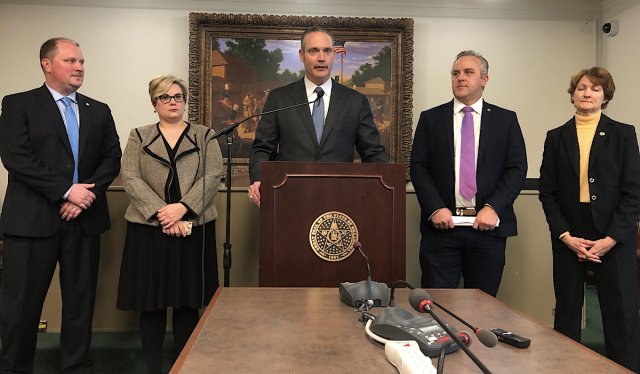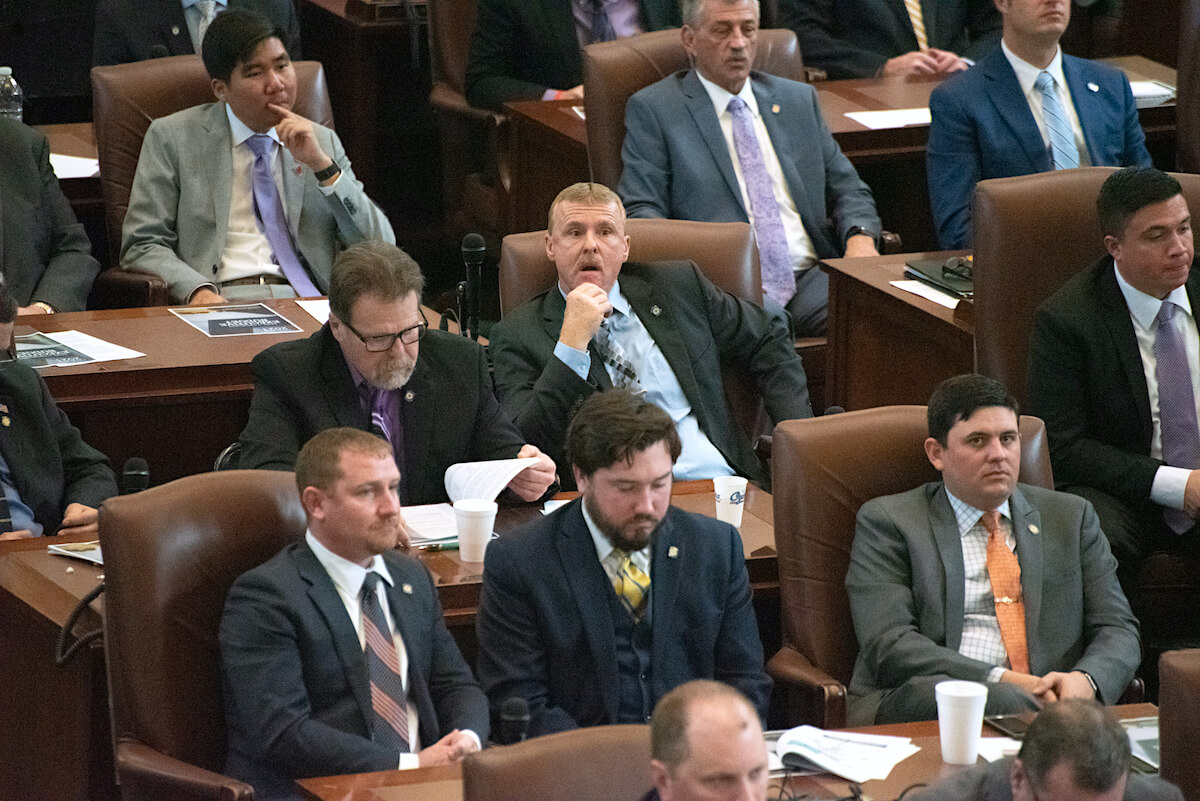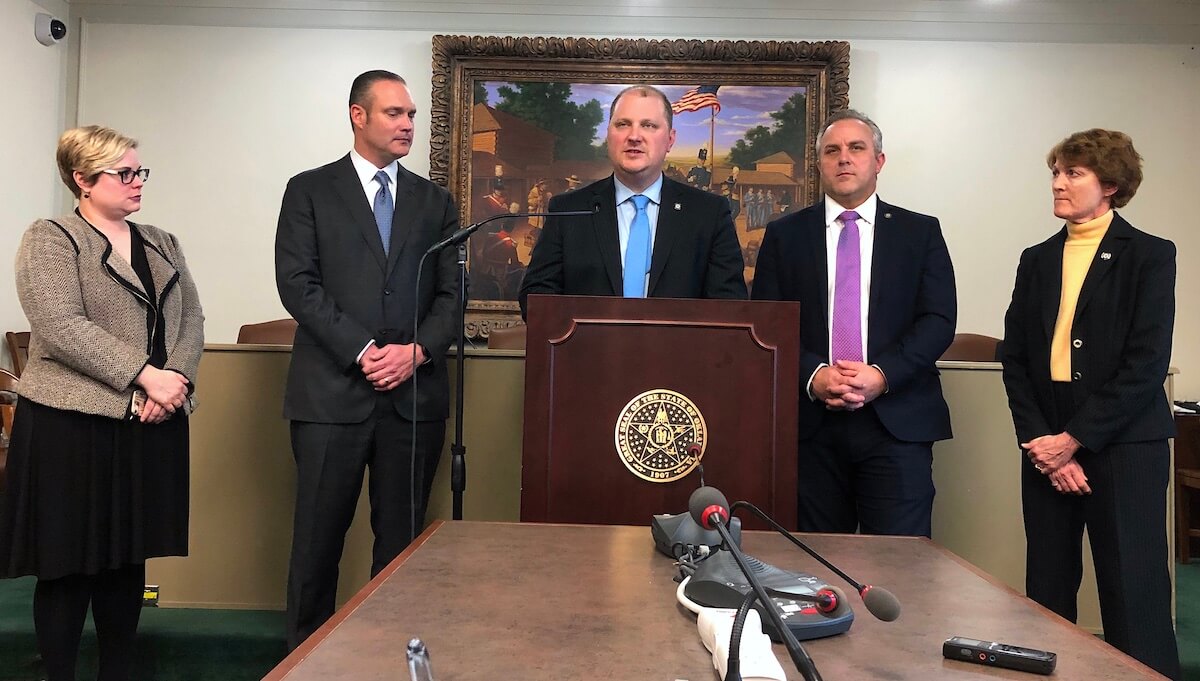
In an effort intended to show leadership by example during the global COVID-19 pandemic, Oklahoma’s legislative leaders have adopted new rules that limit access to the State Capitol and allow attendance flexibility for some legislative work.
Starting Tuesday, March 17, the Capitol will be open only to legislators, staff, credentialed media and state employees with associated job duties. At the end of Tuesday’s work, both chambers of the Legislature are expected to adjourn to an unknown date.
“Just because we’re not here, the work and communication does not stop,” House Speaker Charles McCall (R-Atoka) said during a press conference this afternoon. “We fully plan to fulfill our constitutional duties in this legislative session. What was done today just gives us flexibility.”
McCall’s 100-member House took the most drastic measures Monday, voting 85-3 to adopt an emergency rule authorizing each caucus to designate a proxy representative who can vote on behalf of others. For now, it is unclear if and when House members will use the proxy voting option. It is also unclear when they will return to the Capitol after Tuesday’s adjournment.
“Whether we are here next week is yet to be determined,” said Senate President Pro Tempore Greg Treat (R-OKC). “It is incumbent upon this body to set a good example for the public.”
When lawmakers ultimately return to pass next year’s state budget and conclude priority policy bills, however, the public will likely not be allowed in the building.
“We are limiting access going forward to elected officials, essential capitol staff, credentialed press members and state employees,” McCall said. “This decision is to help [ensure] the public health of the members that serve here and represent the state of Oklahoma, as well as the public.”
Legislative leaders said prohibited members of the public include registered lobbyists, though “legislative liaisons” employed by state agencies will have access.
For their press conference, McCall and Treat were joined by the Democratic leaders of their chambers, who supported the unprecedented efforts.
“We are taking those recommendations that we are giving to the public very seriously,” said House Minority Leader Emily Virgin (D-Norman). “We are in constant communication with the State Department of Health, with the governor’s office and each other in terms of what we do moving forward.”
Senate Minority Leader Kay Floyd (D-OKC) concurred.
“This is, in fact, a public health issue. None of us looks at this as a partisan issue,” Floyd said. “We will continue to be deliberative about those actions.”
Legislators recognize ‘ramifications’ for constituents

The House and Senate each held rare bipartisan caucus meetings earlier Monday, at which Republicans and Democrats had a chance to ask questions of the Oklahoma State Department of Health. As the House prepared for its meeting, OSDH announced two additional positive COVID-19 tests, which brought the state’s total to 10.
“We just gave them a situational update on the COVID-19,” Commissioner of Health Gary Cox told NonDoc after speaking to House members around 11:30 a.m. “We talked for about an hour on a full range of issues, pretty well from A to Z. But most of it was situational and questions.”
Cox said OSDH made no recommendations to the Legislature.
At 1:30 p.m., both the Senate and House convened for open session in their respective chambers, but signs on the Senate doors previewed a new normal: a gallery closed to the public with media allowed to enter.
The Senate quickly recessed to the call of the chair and went into its bipartisan caucus at 2 p.m. Closure of the Senate gallery concerned Ryan Kiesel, a former state representative who serves as the American Civil Liberties Union’s executive director in Oklahoma.
“As long as there is business as usual at the Capitol, it must also be open the public,” said Kiesel, who advocated online over the weekend for greater implementation of social distancing precautions. “[That] underscores the need for both the Senate and the House to immediately move to recess and only consider critical legislation directly pertaining to the emergency or the budget.”
By the end of Monday’s sessions, the Legislature moved in that direction. Kiesel said the House proxy-voting process should place “transparency as its highest priority.”
“It should also be easy for citizens to ethically engage with the lawmaking process. Finally, this system should be used only for those votes that are absolutely necessary for the state to address the current emergency,” Kiesel said. “This is an extraordinary moment. But that does not mean that the government is not without restraint or should be given a license to operate in secrecy. In fact, more than ever, we need to have confidence in our government, to have a clear sense of how they are responding to this crisis.”
Owing to the new public access restrictions, legislative leaders from both chambers and parties said they have instructed their members to prioritize being responsive to the phone calls and emails of their constituents.
“We have communicated to our caucus the importance of maintaining accessibility to the public and reacting and responding to correspondence and phone calls,” Treat said.
Floyd agreed, referencing the “ramifications” for constituents.
“As Leader Virgin said, It is a fluid situation,” Floyd said. “I don’t see it being a hurdle for our constituents.”
Echols talks new rules for Capitol, pending bills

After Monday’s press conference, House Majority Floor Leader Jon Echols (R-OKC) answered a series of additional questions about how the day’s transformative decisions were made and why he believes the Legislature needs to do more than pass a rushed budget agreement and adjourn early.
Echols full remarks can be heard in the 10-minute audio file embedded below. He said one measure the Legislature needs to find compromise on is the issue of “surprise billing.”
“We’re about to have a lot of surprise billing in the state of Oklahoma as we increase our hospital infrastructure where people will be going to wherever the closest ER is, and that ER may or may not be on their insurance,” Echols said. “So all of a sudden, some of these bills that look like they’re not big deals suddenly become big deals.”
Echols said people should know the state government is working and will use the emergency measures implemented Monday in a limited manner.
“Their government is working fine, but it is being cautious. It is setting up contingency plans if the worst-case scenario were to happen,” Echols said. “We have the ability at least in the House to use the proxy votes system to pass a budget, which is really one of the only areas that I see that system being used.”
Echols said he did not cast his vote authorizing House proxies lightly.
“The idea of proxy voting, to me, is not a good idea. But I have searched all around the floor leader’s office for the playbook about how to handle a global pandemic, and they don’t have one here,” Echols said. “We do the very best job we know how to do, and you try to both set a good example to the public and still get your job done.”
Emphasizing that it’s unclear when lawmakers will return to the Capitol after Tuesday, Echols addressed other bills that could be heard before sine die in the audio below:
Executive nominations and sine die deadline
One additional duty of the Senate is to approve or disapprove those nominated by the governor for state cabinet, board or commission positions. Senators had upwards of 70 nominations pending earlier in March. Treat said Monday that dealing with executive nominations is the Senate’s second priority behind passing a budget. He noted that some sort of Skype system could be used to expedite consideration of executive nominations.
Constitutionally, the Legislature is required to adjourn sine die this year by 5 p.m. Friday, May 29. But construction schedules at the State Capitol have had legislative leaders discussing an earlier adjournment to ensure timely completion of chamber renovations.




















